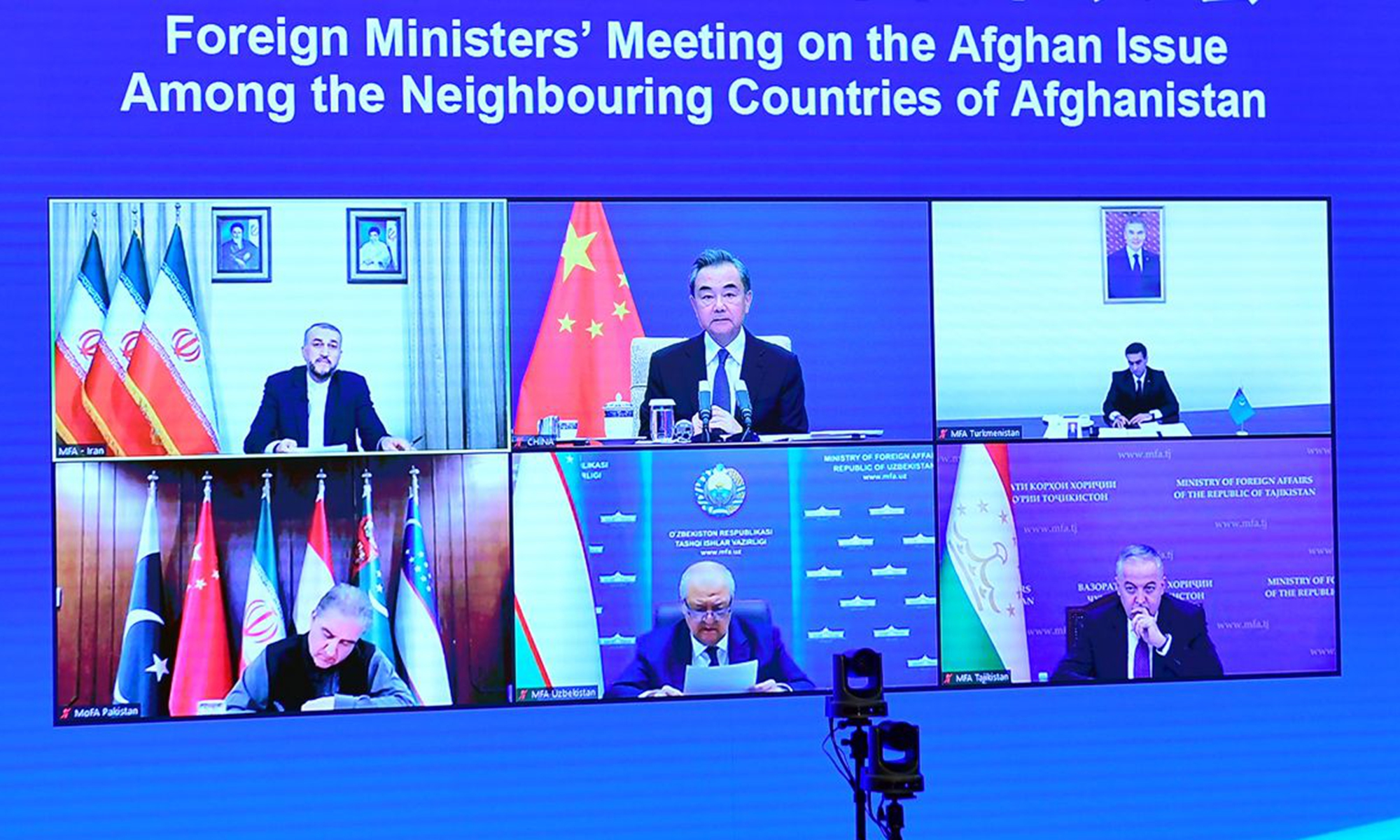Foreign ministers of neighboring countries stress no foothold of terrorist organizations in Afghanistan's territory in joint statement

Chinese State Councilor and Foreign Minister Wang Yi addresses at the first Foreign Ministers' Meeting on the Afghan Issue Among the Neighboring Countries of Afghanistan. Photo: Chinese Foreign Ministry
Neighboring countries of Afghanistan expressed support for the sovereignty, independence and territorial integrity of Afghanistan and non-interference in its international affairs, and emphasized that Afghanistan's territory should not be allowed to pose a threat to other countries, according to a joint statement of the foreign ministers' meeting on the Afghan issue among neighboring countries issued on Thursday.
At the initiative of the Government of Pakistan, the foreign ministers of Pakistan, China, Iran, Tajikistan, Turkmenistan and Uzbekistan held a meeting on the Afghan issue among neighboring countries via video link on Wednesday.
According to the statement, the foreign ministers of these neighboring countries of Afghanistan noted that with the withdrawal of foreign troops from Afghanistan, the people of Afghanistan now have to determine their own future, which should allow in practice to realize "Afghan-led, Afghan-owned" process for national peace and reconciliation.
"The changes undergone in Afghanistan prove yet again that there is no military solution to this issue, and emphasizing the importance of an inclusive political structure in Afghanistan with participation of all ethnic groups," read the statement.
Foreign ministers of these countries emphasized that the relevant members of the UN Security Council should take responsibility for peace and reconstruction of Afghanistan by supporting Afghanistan in developing its social and economic infrastructure. The international community should not abandon the people of Afghanistan. It is also important for neighboring countries to work together to promote peace, security, stability, regional connectivity, people-to-people linkages, economic integration, trade and investment for the benefit of the whole region.
Aside from expressing solidarity with the people of Afghanistan, foreign ministers of the neighboring countries also stressed the necessity of forming an open, inclusive governmental structure in Afghanistan and cautioned against the possibility of incitement and role of spoilers, both inside and outside the country, to derail efforts toward an all-inclusive political settlement in Afghanistan.
In terms of terrorism and drug production, which are among the top concerns of neighboring countries after the changes in Afghanistan, foreign ministers reiterated that terrorist organizations, such as ISIS, Al-Qaeda, ETIM, TTP, BLA, Jondollah and others should not be allowed to maintain a foothold on Afghanistan's territory.
They also pointed out that that the continued increase of narcotic drugs production over the past 20 years in Afghanistan has caused serious harm to the people of Afghanistan and the international community, and stressed the need to stop narcotic drugs production in Afghanistan.
Moreover, they also expressed readiness to keep ports open for Afghanistan and ensure the smooth cross-border flow of goods to facilitate Afghanistan's access to external support, in particular the transport of humanitarian supplies, as well as to help Afghanistan strengthen economic and trade connectivity with the regional countries.
Next round of meetings of these foreign ministers is expected to be held in in Tehran, and the foreign ministers agreed to set up a mechanism of regular consultations of Special Envoys (Special Representatives) for Afghanistan affairs, as well as the regular meetings of representatives of Embassies in Kabul to discuss and coordinate their joint efforts.
Global Times
